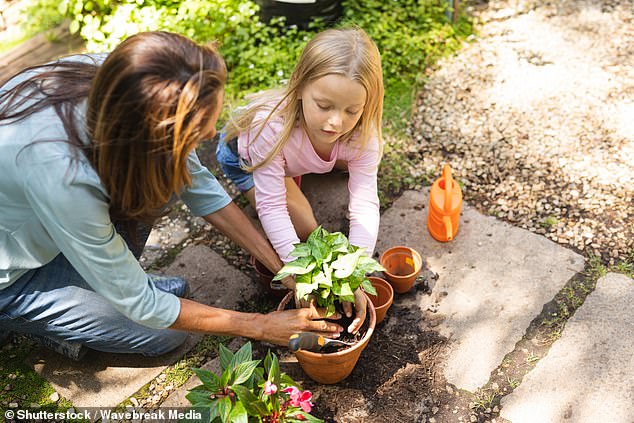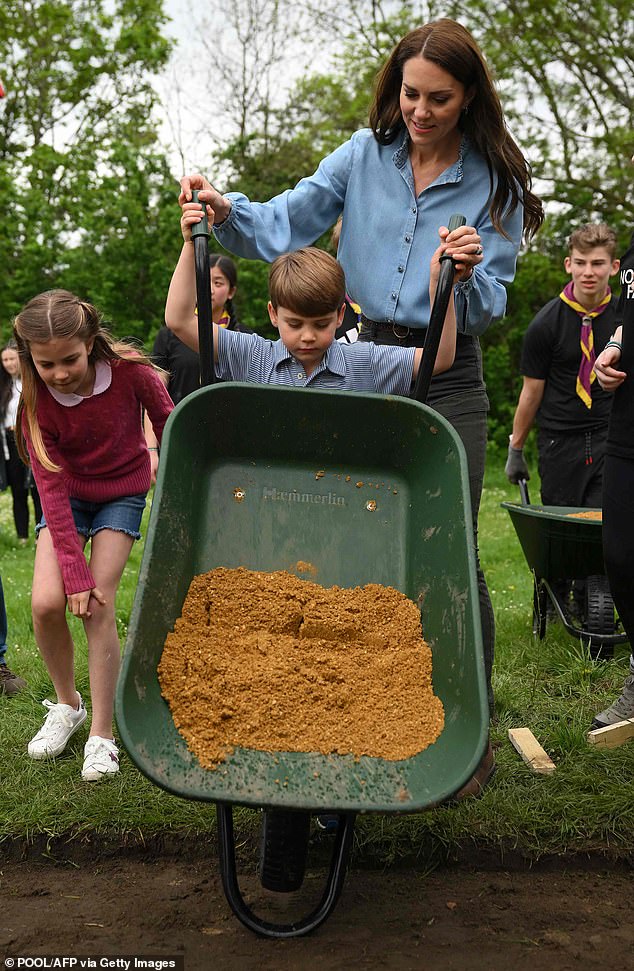They may be the most privileged children in the country, but the royal children, Prince George, 11, Louis, six, and Princess Charlotte, nine, are still expected to help out with household chores.
Last week, a source close to the royals revealed that the Prince and Princess of Wales expect the children to help out with all sorts of tasks around the house, including setting the table, clearing the dishes after dinner and helping to tidy up.
Now, there is growing evidence to suggest that helping out around the house could not only teach them how to cook and clean, but could also make them smarter, more sociable and healthier, according to research.
Below, we reveal exactly which household chores bring the most benefits to children, and the fascinating science that shows why housework could transform their health.
The Prince and Princess of Wales prefer to raise their children without hiring staff in Windsor

The Princess of Wales has been determined to ensure things remain normal for her children.
Scientists have identified specific tasks that are linked to the greatest health benefits.
And at the top of the list is gardening.
Weeding, container gardening and lawn mowing have been linked to lower blood pressure and cholesterol levels in later life, potentially reducing the risk of heart attack and type 2 diabetes.
This is demonstrated by a school garden program based in the United States that observed benefits in children as young as seven years old.
“School-based gardening programs improve dietary intake, academic performance, and reduce metabolic diseases even in the highest-risk minority pediatric populations,” the researchers wrote in the study, published in JAMA Network Open in 2023.

Weeding the garden and chopping vegetables can help keep your children healthy. Not only will little helpers give you one less chore to do, they can also teach them about nutrition and lower their blood sugar and cholesterol levels.
For the program, called Texas Sprouts, schoolchildren ages seven to 12 received 18 one-hour gardening lessons throughout the year that taught them how to grow plants and turn their harvest into healthy meals.
Parents were also invited to classes to review their nutritional knowledge and, as a result, these children began to eat more vegetables and fiber, which improved their blood sugar levels.
Researchers at the University of Texas measured the students’ height, weight, body mass index (BMI), insulin and glucose levels, and blood fats — all indicators of type 2 diabetes risk.
They found that participating in gardening classes was linked to a 13 percent improvement in blood sugar stability (making kids less likely to eat junk food).
It also resulted in a reduction in cholesterol, fatty deposits that build up in blood vessels, damaging them and increasing the risk of heart attack and stroke.
When it comes to boosting brain power, all household chores may have some benefit, according to research.
A 2019 study A study by experts at the University of Virginia involving nearly 10,000 elementary school children asked students about their math, science and reading skills and compared them to the amount of homework they did.
The results showed that the more homework a child completed, the better his or her academic score.
Children who rarely did chores were 25 percent less likely to say they were doing well in class and 27 percent more likely to be in the bottom group for self-rated life satisfaction.
They were 24 percent more likely to be in the bottom group when it came to relationships with other children.
Researchers also found that youth who did chores often also scored better on math, reading and science tests, compared to those who never or rarely did chores.

Studies show that the more chores a child does, the more self-confidence he or she has and the better academic results he or she achieves, especially in math and science.

Researchers at the University of Virginia also found that the self-confidence that gives them an academic boost also helps them be happier and more sociable.
Researchers have also found evidence to suggest that this higher academic performance could lead to higher earnings.
An 85-year multigenerational study by Harvard researchers found a strong connection between doing chores in childhood and career success later in life.
Research into the backgrounds of over 700 high-achieving individuals revealed that a strong work ethic is something that helps adults be happy and successful.
Researchers at the University of Virginia also found that children who rarely help out around the house are up to 30 percent more likely to be dissatisfied with their lives.
Asking your children to help you prepare dinner can also improve their problem-solving skills and working memory.
Research of 2022 A study published in the Australian Occupational Therapy Journal found that children who were asked to help with family meals were more likely to exhibit better academic performance and problem-solving skills.
The study looked at parents of 207 children aged between five and 13. They were asked about the number of tasks their children completed each day (such as cooking and tidying up) and about their children’s memory and ability to concentrate on different tasks.
Children who helped with “self-care” tasks, such as helping prepare the family meal, were more likely to have better working memory and inhibition.
Deanna Tepper, the researcher who led the study, said: “Children who cook a family meal or weed the garden regularly may be more likely to excel in other aspects of life, such as schoolwork or problem solving.”
She explained that delays in the development of a child’s executive function can lead to difficulties in their ability to plan and solve problems as adults.


